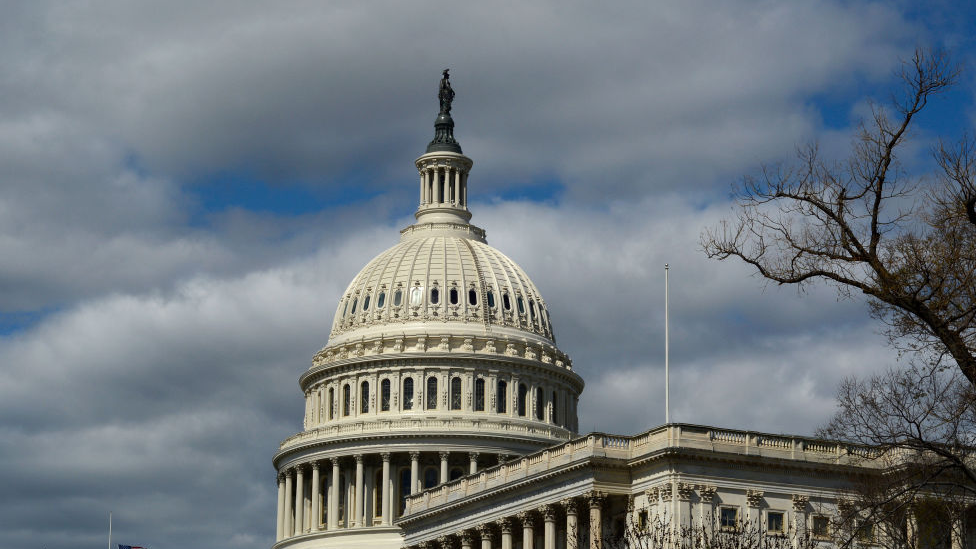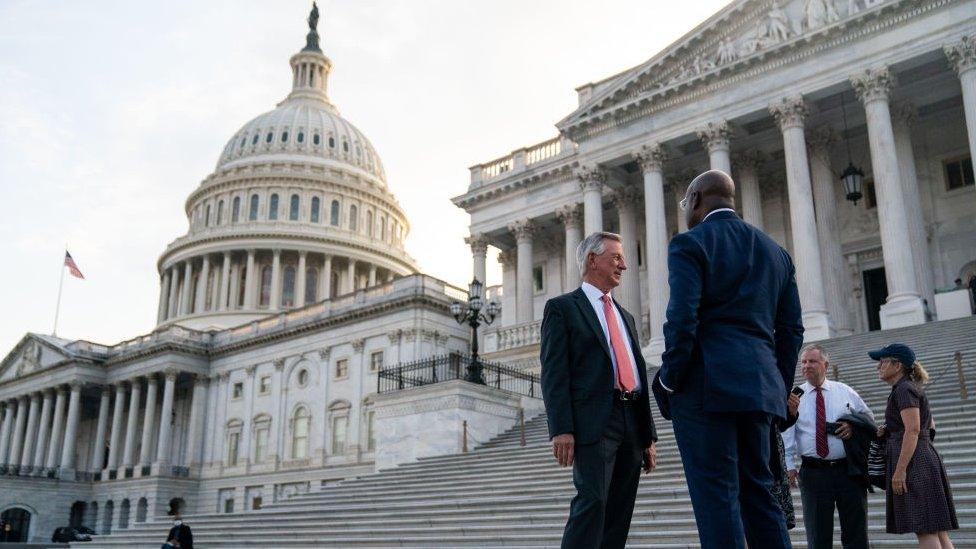House passes the $1.7tn US spending bill. But what's in it?
- Published

The spending bill now goes to Joe Biden's desk.
The US Congress has passed a nearly $1.7 trillion (£1.4tn) spending bill - most likely averting a partial government shutdown.
The House of Representatives passed the bill on Friday afternoon by 225 votes to 201.
The bill will now go to President Joe Biden who needs to sign it before midnight.
The package will fund the US government all through the next fiscal year, to 30 September.
It had passed the Senate on Thursday by 68 to 29 in a cross-party vote.
The 4,155-page budget contains measures to help Ukraine, bolster US defence, and funds for US domestic priorities.
The bumper package contains $772bn for domestic programmes and $858bn for defence. It includes almost $45bn in emergency aid to Ukraine and about $38bn for regions recovering from natural disasters.
Changes to retirement programmes and healthcare for low-income Americans are also in the legislation.
Here are some other ways the government plans to spend tax dollars in the coming year, along with separate provisions added to the omnibus legislation.
Support for Ukraine: The $45bn for Ukraine includes funding for humanitarian and military aid as well as Nato allies.
Electoral Count Act reforms: Included in the spending package are changes to the Electoral Count Act in response to the 6 January Capitol riots. It would clarify the role of the US vice-president in tallying and certifying Electoral College votes. Former President Donald Trump wrongly claimed his vice-president had the power to overturn their 2020 election loss.
TikTok restrictions: The bill includes a plan to ban downloads of the app - owned by its Chinese-based parent company ByteDance - on government-owned phones and other digital devices amid national security concerns.
Medicaid: The bill ditches a Covid-era provision that had relaxed eligibility restrictions for Medicaid - which provides healthcare for low-income Americans. Millions of people could now face losing health coverage in the spring.
Nursing mothers: An amendment dubbed the "Pump Act" was included in the bill. It expands legislation that extends protections for new parents who need to breastfeed their babies or pump at work. A second amendment for pregnant workers ensures they are given reasonable accommodations in the workplace.
Lobster rules: A provision in the package delays by six years new rules for lobster fisheries aimed at protecting the endangered right whale from becoming entangled in fishing gear.
FBI headquarters : A lengthy battle between the states of Maryland and Virginia over where to relocate the current Federal Bureau of Investigation headquarters - currently in Washington DC - is pushed down the road, with text in the bill allowing for further consultation on future sites.
Pay rise for troops: A 4.6% wage increase for members of the military.
Capitol police support: The congressional police service will get a boost of $132m, bringing its total budget to $734.5m.
Security for senators: US lawmakers have faced growing threats in recent years, and $2.5m has been approved to improve security at senators' residences.
College students: Congress plans to increase the maximum Pell Grant award - annual funding for low-income undergraduates - by $500 to $7,395.
Childcare: There is a 30% increase of funding - to $8bn - for the Child Care and Development Block Grant, which helps low-income families pay for childcare.
Environmental protections: The Environmental Protection Agency gets an increase of $576m over its budget last year.
Several Republicans lawmakers have expressed frustration over the size of the package and at being asked to vote on a mammoth bill under a tight deadline, giving them little time to read it through.
It is expected to be the last major bill of the current Congress before Republicans take control of the House in January after November's midterm elections.
Last week, the Senate passed a stopgap federal spending bill that gave lawmakers additional time to negotiate a broader package, extending the original 17 December funding deadline to 23 December.
On Tuesday morning, House and Republican negotiators unveiled that package, which was months in the making.
The "omnibus spending bill" raises funding from about $1.5tn in the last fiscal year.
A shutdown happens when parts of the government close because politicians fail to agree on a budget. The political game of brinksmanship has become a feature of US politics in recent decades.
Under the US system, the different branches of government have to reach an agreement on spending plans before they can become law.
Related topics
- Published20 December 2022

- Published30 September 2021
